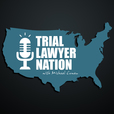54 – Michael O’Neill – Delivering Justice: From UPS Defense Attorney to Plaintiff Trial Lawyer

Summary: In this episode of Trial Lawyer Nation, Michael Cowen sits down with former defense attorney for UPS and current plaintiff attorney, Michael O’Neill. This show covers an array of topics, including the defense’s advantages in catastrophic injury cases, why O’Neill switched sides of the courtroom (and why it made him such a good plaintiff attorney), what companies can’t defend against, and why referring out cases can make you more money.<br> The episode kicks off with Cowen asking O’Neill why large companies use the same defense firm for cases around the country. O’Neill says the lawyer needs to know a very specific field, know the company well, and have a consistent defense. O’Neill would receive a call in the middle of the night or on a weekend and would need to travel immediately to the scene of a crash. UPS would refer to this as “boots on the ground.” He emphasizes that marshalling evidence while it’s fresh is pertinent to the success of any case. O’Neill shares a story of a time where he went to the scene and pointed out a detail the police missed which would have hurt their case on liability. He was also there while the police were writing their reports and describes how he could influence what was written. Cowen and O’Neill discuss the defense’s role in shaping the narrative of the case from the start, the role of psychology with the first responders, the defense’s advantage in this, and what plaintiff lawyers CAN (but most DON’T) do to combat this.<br> Cowen then asks what everyone’s thinking; why did O’Neill switch to the plaintiff’s side? O’Neill replies that the curiosity has always been there. He then describes a scenario, not uncommon to him, where he had a defense verdict on a case he believed “that’s an easy 7-figure case that should have been won and we zeroed them.”<br> The conversation shifts to what companies CAN’T defend. Both agree on exposing poor training programs as the key to winning “nuclear verdicts” in commercial vehicle and trucking cases. They discuss this and other factors which make the case about the 3 months before, as opposed to the 5 seconds before the crash. O’Neill then brings up a defense trucking podcast by <a href="https://podcasts.apple.com/us/podcast/how-to-defend-against-a-nuclear-verdict/id1485600387?i=1000468023910" target="_blank" rel="noopener noreferrer">FreightWaves </a>which recently discussed the defense’s fear of “the second lawyer” and the impact of referral attorneys on the insurance industry. As a “second lawyer” himself, Cowen shares a recent example of an insurance company who learned once he became involved all prior negotiations at a much lower number were out the window.<br> One of the most important details for a successful catastrophic injury lawyer to accomplish is to make the case about the company, not the individual. Cowen shares a story of a case where the CMV driver was high on meth at the time of the accident. The case against the driver was already strong, but when asked by a colleague why he was working so hard on the case Cowen replied, “It doesn’t take much money to teach a meth head a lesson. It needs to be about the company and what it takes to teach the company a lesson.” O’Neill echoes this with another great example of a strong case that he made even stronger by putting in the work.<br> O’Neill and Cowen then praise trucking trial lawyer <a href="https://triallawyernation.com/episode/02-joe-fried/" target="_blank" rel="noopener noreferrer">Joe Fried</a> and how instrumental he has been on creating the current “abundance mentality” of the Academy of Truck Accident Attorneys (ATAA). The ATAA abundance mentality encompasses the idea that there are plenty of trucking cases to go around, and we all perform better when we share information and establish good law. “The tide raises good ships,” O’Neill eloquently responds. When comparing this to the defense bar, O’Neill says the difference is night and day.
